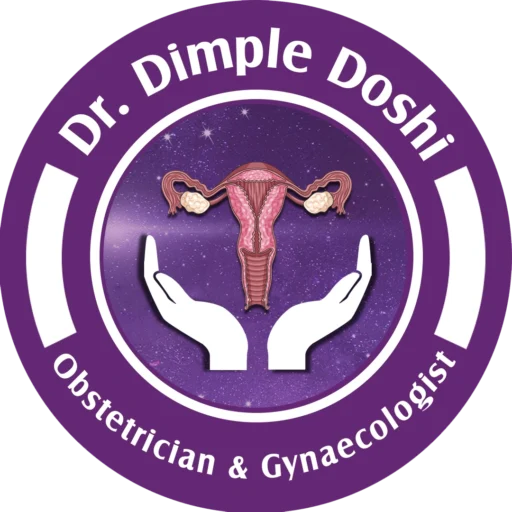Preconceptional Counselling: Start Your Parenthood Journey Right
Planning a Pregnancy? Start with Preconceptional Counseling
Are you thinking of starting a family but unsure how to prepare? Many couples overlook one crucial step—optimizing their health before pregnancy. Skipping this step can increase the risk of complications like preterm birth, low birth weight, or genetic issues in babies.
An unplanned or poorly prepared pregnancy can bring anxiety, unexpected health challenges, and increased chances of maternal and newborn complications. Without proper guidance, vital checks and preventive measures may be missed, leading to avoidable risks during pregnancy.
Preconceptional Counseling helps you plan for a safe and healthy pregnancy before you conceive. Ideally started 3 months before conception (or at least one month prior), this counseling focuses on nutrition, vaccinations, managing chronic conditions, and lifestyle adjustments.
At Vardaan Hospital, Dr. Dimple Doshi provides comprehensive, evidence-based pre-pregnancy consultations—ensuring both mother and baby enjoy the best possible start.
What Is Preconceptional Counseling and Why Is It Important?
Preconceptional counseling is a medical consultation that helps women prepare for pregnancy by identifying risks and ensuring optimal health.
- Identifies genetic and medical risks early
- Ensures proper nutrition and supplements before conception
- Prepares your body for a safe and healthy pregnancy
Synonyms: Preconception care, pre-pregnancy counseling, pre-pregnancy planning, preconception health consultation
Planning a Pregnancy? Start with Preconceptional Counseling
Thinking about having a baby? Preconceptional counseling is your first step for a healthy and stress-free pregnancy journey.
- Discuss plans and expectations with your doctor
- Identify health risks and correct them early
- Get screening and vaccinations before conception
What Is Done During Preconceptional Counseling?
Preconception counseling involves medical assessments, tests, and lifestyle advice to reduce complications and prepare you for pregnancy.
- Detailed Medical & Family History: Includes genetic disorders, birth defects, previous miscarriages, and chronic illnesses.
- Genetic & Risk Assessment: Based on family history, ethnicity, age, consanguinity, and carrier status for conditions like thalassemia.
- Screening Tests:
- CBC, urine analysis, blood type
- Rubella, Hepatitis B, HIV, HCV screening
- Diabetes, chlamydia, gonorrhea tests
- Cervical cytology & TORCH infections
- Vaccination Status: COVID-19, Hepatitis B, Rubella, Varicella, Tdap, HPV, and Influenza vaccines.
- Ultrasound: Pelvic scan to detect uterine or genital tract abnormalities.
- Management of Chronic Conditions: Ensure diabetes, hypertension, thyroid, or cardiac issues are under control.
- Body Weight & Nutrition: BMI check and dietary guidance for healthy pregnancy.
- Environmental Risk Assessment: Avoid exposure to endocrine disruptors in plastics, cosmetics, and pesticides.
- Mental Health Screening: Evaluate for depression, anxiety, or major stressors.
- Medication Review: Stop or modify harmful medications like hormonal pills, high-dose Vitamin A, certain epilepsy or BP drugs.
- Folic Acid & Supplements: Begin folic acid 3 months before pregnancy to prevent birth defects.
- Lifestyle Advice:
- Balanced diet with green leafy vegetables
- Exercise regularly to maintain ideal weight
- Stress reduction through meditation and yoga
What Are the Goals of Preconceptional Counseling?
The main aim is to reduce pregnancy risks, ensure maternal wellness, and prepare the body for safe conception and delivery.
- Identify and manage pre-existing conditions
- Plan safe timing for conception
- Improve fertility and pregnancy outcomes
What Health Assessments Are Included in Preconceptional Counseling?
These assessments help detect health concerns that may impact pregnancy.
- Blood pressure and BMI evaluation
- Blood sugar and thyroid profile
- Screening for infections (HIV, Hepatitis, Rubella)
- Dental and pelvic health check
Which Vaccinations Should Be Taken Before Pregnancy?
Vaccinations protect both mother and baby from harmful infections during pregnancy.
- Rubella (MMR) vaccine
- Hepatitis B vaccine
- Varicella vaccine
- Tdap (Tetanus, Diphtheria, Pertussis)
- HPV and Influenza vaccines if indicated
What Supplements Are Recommended Before Conception?
Essential supplements ensure proper fetal development and reduce birth defects.
- Folic acid (400 mcg daily)
- Iron and calcium tablets
- Vitamin D and Omega-3 as required
How Does Lifestyle Affect Preconception Health?
Healthy habits before conception improve maternal and fetal health significantly.
- Quit smoking and alcohol
- Follow a balanced diet and hydrate well
- Exercise regularly to maintain ideal weight
What Preconception Screening Tests Are Recommended?
Screening helps identify hidden risks that may affect pregnancy outcomes.
- Thyroid function and diabetes screening
- STD testing for HIV, Syphilis, Hepatitis
- Genetic carrier screening if family history exists
Why Is Genetic Counseling Important Before Pregnancy?
Genetic counseling identifies inherited risks and offers solutions before conception.
- Family history of genetic disorders
- Previous child with birth defects
- Consanguineous marriage (related partners)
How to Manage Chronic Conditions Before Pregnancy?
Manage existing health conditions to prevent complications during pregnancy.
- Monitor blood sugar and BP regularly
- Review medications with your doctor
- Keep thyroid and hormonal balance under control
How Long Before Pregnancy Should You Start Preconception Care?
Begin preconception care 3–6 months before trying for pregnancy for best results.
- Start folic acid 3 months prior
- Complete vaccinations in advance
- Manage health conditions early
Medical Code for Preconceptional Counselling
ICD-10 Codes for Preconceptional Counselling
| ICD-10 Code | Description |
|---|---|
| Z31.6 | Encounter for preconceptional counselling and advice |
| Z31.69 | Other specified procreative management |
| Z31.84 | Encounter for fertility preservation procedure |
| Z34.00 | Supervision of normal first pregnancy, unspecified trimester (if applicable later) |
CPT Codes for Preconceptional Counselling
| CPT Code | Procedure |
|---|---|
| 99401 | Preventive medicine counseling, individual, approximately 15 minutes |
| 99402 | Preventive medicine counseling, individual, approximately 30 minutes |
| 99403 | Preventive medicine counseling, individual, approximately 45 minutes |
| 99404 | Preventive medicine counseling, individual, approximately 60 minutes |
| 0500F | Initial prenatal care visit (used if transitioning to pregnancy) |
FAQs – Preconceptional Counseling
Q1. What is preconceptional counseling?
Ans. Preconceptional counseling is a health consultation provided before pregnancy to optimize maternal health, identify risks, and improve chances of a healthy pregnancy and baby.
Q2. Why is preconceptional counseling important?
Ans. It helps identify and manage health risks, ensures nutritional adequacy, updates vaccinations, addresses genetic concerns, and educates couples on lifestyle changes before conception.
Q3. When should I schedule a preconception counseling visit?
Ans. Ideally, 3 to 6 months before trying to conceive, so you have time to address health issues, start supplements like folic acid, and make lifestyle changes.
Q4. What are the main goals of preconception counseling?
Ans. The primary goals are to ensure maternal health, identify risk factors, manage chronic conditions, provide genetic counseling if needed, and improve pregnancy outcomes.
Q5. What does preconception counseling include?
Ans. It includes a complete health assessment, vaccination review, nutritional guidance, lifestyle advice, screening for genetic or infectious risks, and planning for a safe pregnancy.
Q6. What medical tests are done during preconception counseling?
Ans. Blood sugar, thyroid function, hemoglobin, vitamin D, rubella immunity, STI screening, and other personalized tests based on your health history.
Q7. What lifestyle changes are recommended before pregnancy?
Ans. Stop smoking and alcohol, maintain a healthy weight, manage stress, get adequate sleep, and start prenatal vitamins with folic acid.
Q8. Which vitamins and supplements are essential before pregnancy?
Ans. Folic acid (400–800 mcg daily), iron, calcium, and vitamin D are most important. Your doctor may suggest additional supplements if required.
Q9. Does preconception counseling involve genetic screening?
Ans. Yes, for couples with a family history of genetic disorders or certain ethnic backgrounds, genetic counseling and carrier screening may be advised.
Q10. Can preconception counseling help with fertility issues?
Ans. Yes, it identifies and addresses factors like hormonal imbalance, PCOS, thyroid disorders, and lifestyle issues that can impact fertility.
Q11. What are the common risk factors evaluated in preconception counseling?
Ans. Diabetes, hypertension, thyroid problems, anemia, previous pregnancy complications, and lifestyle risks like smoking or substance abuse.
Q12. How does preconception counseling reduce pregnancy complications?
Ans. By optimizing maternal health, correcting deficiencies, managing chronic conditions, and educating about early warning signs for complications.
Q13. What role does vaccination play in preconception care?
Ans. Vaccinations for rubella, hepatitis B, and chickenpox are recommended before pregnancy to prevent infections that can harm mother and baby.
Q14. Is preconception counseling necessary for second pregnancy?
Ans. Yes, especially if there were complications in the previous pregnancy or if maternal health or age has changed since the last childbirth.
Q15. How do I prepare for a preconception counseling appointment?
Ans. Carry your medical history, list of medications, previous pregnancy records, and note down questions about diet, supplements, and health concerns.
Take charge of your health today.
Book your consultation with Dr. Dimple Doshi at
Vardaan Hospital, Goregaon West, Mumbai.


 WhatsApp
WhatsApp +91-9820686823
+91-9820686823 Book Appointment
Book Appointment